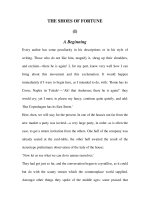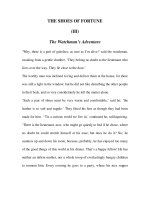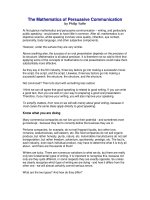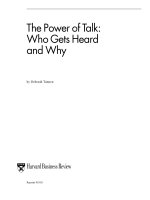Tài liệu THE SHOES OF FORTUNE (III) doc
Bạn đang xem bản rút gọn của tài liệu. Xem và tải ngay bản đầy đủ của tài liệu tại đây (27.38 KB, 9 trang )
THE SHOES OF FORTUNE
(IV)
A Moment of Head Importance—An Evening’s
‘Dramatic Readings’—A Most Strange Journey
Every inhabitant of Copenhagen knows, from personal inspection, how the
entrance to Frederick’s Hospital looks; but as it is possible that others, who
are not Copenhagen people, may also read this little work, we will
beforehand give a short description of it.
The extensive building is separated from the street by a pretty high railing,
the thick iron bars of which are so far apart, that in all seriousness, it is said,
some very thin fellow had of a night occasionally squeezed himself through
to go and pay his little visits in the town. The part of the body most difficult
to manage on such occasions was, no doubt, the head; here, as is so often the
case in the world, long-headed people get through best. So much, then, for
the introduction.
One of the young men, whose head, in a physical sense only, might be said
to be of the thickest, had the watch that evening.The rain poured down in
torrents; yet despite these two obstacles, the young man was obliged to go
out, if it were but for a quarter of an hour; and as to telling the door-keeper
about it, that, he thought, was quite unnecessary, if, with a whole skin, he
were able to slip through the railings. There, on the floor lay the galoshes,
which the watchman had forgotten; he never dreamed for a moment that
they were those of Fortune; and they promised to do him good service in the
wet; so he put them on. The question now was, if he could squeeze himself
through the grating, for he had never tried before. Well, there he stood.
‘Would to Heaven I had got my head through!’ said he, involuntarily; and
instantly through it slipped, easily and without pain, notwithstanding it was
pretty large and thick. But now the rest of the body was to be got through!
‘Ah! I am much too stout,’ groaned he aloud, while fixed as in a vice. ‘I had
thought the head was the most difficult part of the matter—oh! oh! I really
cannot squeeze myself through!’
He now wanted to pull his over-hasty head back again, but he could not. For
his neck there was room enough, but for nothing more. His first feeling was
of anger; his next that his temper fell to zero. The Shoes of Fortune had
placed him in the most dreadful situation; and, unfortunately, it never
occurred to him to wish himself free. The pitch-black clouds poured down
their contents in still heavier torrents; not a creature was to be seen in the
streets. To reach up to the bell was what he did not like; to cry aloud for help
would have availed him little; besides, how ashamed would he have been to
be found caught in a trap, like an outwitted fox! How was he to twist himself
through! He saw clearly that it was his irrevocable destiny to remain a
prisoner till dawn, or, perhaps, even late in the morning; then the smith must
be fetched to file away the bars; but all that would not be done so quickly as
he could think about it. The whole Charity School, just opposite, would be in
motion; all the new booths, with their not very courtier-like swarm of
seamen, would join them out of curiosity, and would greet him with a wild
‘hurrah!’ while he was standing in his pillory: there would be a mob, a
hissing, and rejoicing, and jeering, ten times worse than in the rows about
the Jews some years ago—‘Oh, my blood is mounting to my brain; ‘tis
enough to drive one mad! I shall go wild! I know not what to do. Oh! were I
but loose; my dizziness would then cease; oh, were my head but loose!’
You see he ought to have said that sooner; for the moment he expressed the
wish his head was free; and cured of all his paroxysms of love, he hastened
off to his room, where the pains consequent on the fright the Shoes had
prepared for him, did not so soon take their leave. But you must not think
that the affair is over now; it grows much worse.
The night passed, the next day also; but nobody came to fetch the Shoes.
In the evening ‘Dramatic Readings’ were to be given at the little theatre in
King Street. The house was filled to suffocation; and among other pieces to
be recited was a new poem by H. C. Andersen, called, My Aunt’s
Spectacles; the contents of which were pretty nearly as follows:
‘A certain person had an aunt, who boasted of particular skill in fortune-
telling with cards, and who was constantly being stormed by persons that
wanted to have a peep into futurity. But she was full of mystery about her
art, in which a certain pair of magic spectacles did her essential service. Her
nephew, a merry boy, who was his aunt’s darling, begged so long for these
spectacles, that, at last, she lent him the treasure, after having informed him,
with many exhortations, that in order to execute the interesting trick, he need
only repair to some place where a great many persons were assembled; and
then, from a higher position, whence he could overlook the crowd, pass the
company in review before him through his spectacles. Immediately ‘the
inner man’ of each individual would be displayed before him, like a game of
cards, in which he unerringly might read what the future of every person
presented was to be. Well pleased the little magician hastened away to prove
the powers of the spectacles in the theatre; no place seeming to him more
fitted for such a trial. He begged permission of the worthy audience, and set
his spectacles on his nose. A motley phantasmagoria presents itself before
him, which he describes in a few satirical touches, yet without expressing his
opinion openly: he tells the people enough to set them all thinking and
guessing; but in order to hurt nobody, he wraps his witty oracular judgments
in a transparent veil, or rather in a lurid thundercloud, shooting forth bright
sparks of wit, that they may fall in the powder-magazine of the expectant
audience.’
The humorous poem was admirably recited, and the speaker much
applauded. Among the audience was the young man of the hospital, who
seemed to have forgotten his adventure of the preceding night. He had on the
Shoes; for as yet no lawful owner had appeared to claim them; and besides it
was so very dirty out-of-doors, they were just the thing for him, he thought.
The beginning of the poem he praised with great generosity: he even found
the idea original and effective. But that the end of it, like the Rhine, was
very insignificant, proved, in his opinion, the author’s want of invention; he
was without genius, etc. This was an excellent opportunity to have said
something clever.
Meanwhile he was haunted by the idea—he should like to possess such a
pair of spectacles himself; then, perhaps, by using them circumspectly, one
would be able to look into people’s hearts, which, he thought, would be far









